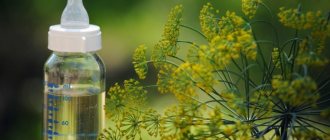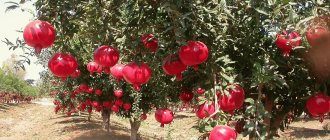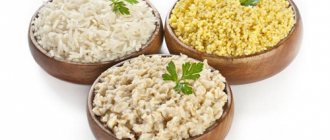Juicy pomegranate fruits were used in the treatment of various diseases by the famous ancient Greek healer and physician, the “father of medicine” Hippocrates, who lived in 460–370. BC e. Until now, the advisability of using the “divine fruit” for medical purposes has been justified not only for diarrhea, but also for other malfunctions of the body. Pomegranate for diarrhea, especially its crust, is popularly considered an ideal antidiarrheal remedy.
When consuming pomegranate peels for diarrhea, you must follow the recipe requirements and familiarize yourself with the contraindications, i.e. follow the main principle of the great healer - “Do no harm.”
Why does diarrhea happen?
Diarrhea in a child most often occurs due to overeating.
Infants often suffer from diarrhea when the food entering the body does not have time to be processed. In this case, the cause of the disease is overeating.
Often diarrhea is a consequence of nervous excitement or fear. Often, a baby’s delicate stomach suffers from poisoning with unfamiliar food.
Mothers need to be extremely careful in this case and introduce new complementary foods in small portions, observing the reaction of the baby’s gastrointestinal tract. Loose stools often accompany the process of teething. At the same time, sometimes the temperature even rises.
In older children, the cause of diarrhea is often poor nutrition and prolonged digestion of carbohydrates. Poor diet and infections also create a stressful situation in the intestines of children.
In any case, childhood diarrhea is dangerous! It leads to depletion of the body, loss of fluid (and the body is 70% water). Diarrhea is accompanied by vomiting, abdominal pain, and flatulence. If the liquid stool is dark in color or contains blood, you should immediately consult a doctor.
These symptoms may indicate internal bleeding. In addition to treatment, you need to know what food you can give your child during an intestinal disorder. Signs of diarrhea:
- Even if there is no loose stool, if the child has abdominal pain, he should be shown to a doctor.
- On the eve of diarrhea, a clear seething sensation is felt in the intestines, which indicates fermentation and improper digestion.
- Foamy discharge with a putrid odor.
Composition of pomegranate peel
Why do pomegranate peels help with intestinal upset? The answer lies in the chemical composition of the product. In addition to the cellulose contained in the peel, pomegranate skins contain:
- Tannins. Thus, tannins account for 28% of the total weight of the product. They form a special protective film on the surface of the mucosa. When large volumes enter the body, the functioning of the stomach is disrupted and a person’s appetite decreases.
- Catechin (antioxidant). Slows down the course of oxidative reactions.
- Anthocyanins (coloring substances responsible for the color of the peel). Relieves inflammation.
- Ursolic acid. Helps reduce cholesterol levels.
- Minerals – potassium, zinc, calcium, iron, aluminum.
It is the astringent effect, caused by the presence of tannins, that makes it possible to effectively use pomegranate peels for diarrhea.
Therapeutic diet for mild disorders
For diarrhea, it is useful to eat foods enriched with prebiotics.
Mild intestinal disorders occur when overeating fatty foods. When the cause is eliminated, the disease goes away.
If the cause of diarrhea is known to the parents, and it is not complicated by fever and vomiting, you can treat the baby at home.
In this case, it is necessary to temporarily exclude the use of foods that provoke excessive bile secretion or have laxative properties.
These are mushrooms, baked goods, fatty fried meat, smoked fish, dairy products. Heavy foods should be replaced with steamed dishes, porridge with water, and crackers. When the child is recovering, you can gradually introduce familiar foods and dishes into the diet. You can give kefir, fermented baked milk, cottage cheese.
If products are enriched with beneficial bacteria and prebiotics, this is doubly beneficial!
General information
Pomegranate peel is an excellent natural antibiotic. The peel of a ripe fruit makes up 25-50% of its volume and weight. To prepare a healing decoction, one medium fruit is enough.
A decoction of the peel can be given to children over 2 years old. You need to give water to your child carefully, since this is a fairly concentrated product. The children's digestive system cannot always process all the components of the medicine.
Useful properties of pomegranate peels
The plate provides information about the substances that make up pomegranate peel.
| What does it contain? | Description |
| Ellagic acid | A powerful antioxidant that can remove all substances containing free radicals from the body. Helps suppress the risk of cancer cell formation. |
| Tannins | They have a strong astringent and anti-inflammatory effect. They make the decoction effective for infectious indigestion, which is accompanied by inflammation of the mucous membranes and pronounced irritation. |
| Catechins | They normalize metabolic processes, help strengthen the walls of capillaries, making them more elastic. Thanks to them, gastrointestinal motility is normalized, swelling and other congestion are eliminated. |
| Bioflavonoids | Complex bioactive substances that work best in conjunction with vitamin C. Bioflavonoids help enhance the effect of ascorbic acid. Their effect is similar to that of P vitamins. The main advantage is better absorption. |
| Polyphenols | They have a restorative effect and help remove all unnecessary substances and components. They activate the reduction of the processes of destruction and aging of cells, accompanying the inhibition of the activity of pathogenic bacteria. |
Main contraindications
It is not recommended to take pomegranate peels if:
- hypersensitivity to pomegranate and its components;
- exacerbation of duodenal ulcer;
- acute or chronic pathologies that reduce liver function;
- exacerbation of stomach ulcers;
- acute or chronic pathologies that contribute to a decrease in kidney function;
- exacerbation of gastritis;
- congestion in the gastrointestinal tract (the astringent property of the drug aggravates the clinical picture).
Pre-medical diagnostics
Parents should try to determine the cause of diarrhea themselves, so that they can then tell the doctor about them. Self-diagnosis should include the following steps:
- Examination of stool for mucus and blood content;
- Use special pharmacy tests to determine the cause of diarrhea - rotavirus or dysentery;
- Examine the baby’s mucous membranes and skin;
- Measure body temperature;
- Find out what your child ate without your knowledge.
What to do if your baby is sick
For diarrhea, you need to give your baby breast milk and formula.
If vomiting and diarrhea occur, you should immediately call a doctor, warning him about the symptoms.
While he is traveling, give formula or breast milk more often to keep his body hydrated. During this period, you should not give another mixture or unfamiliar compounds.
After each bowel movement, the baby should be given some water to drink. If he refuses to take the bottle, you can use a twenty-gram syringe without a needle or a teaspoon.
Possible side effects
In case of an overdose caused by excessive consumption of a medicinal drink, a person may develop the following symptoms: attacks of nausea ending with vomiting, loss of appetite up to complete loss of interest in food, skin rashes.
If the permissible norms for drinking the drink are not observed, the development of overdose symptoms cannot be ruled out.
Long-term exposure to tannins causes the following pathological conditions: atrophy of the gastric and intestinal mucosa, impaired digestive function, stagnation of food in the stomach. Using a decoction of pomegranate peels for enemas causes the development of constipation and the formation of anal fissures as a result of dry tissue.
Infusion and decoction of pomegranate peels is a fairly effective remedy that solves the problem of mild diarrhea. It is important to remember that self-treatment of diarrhea is allowed for no longer than 3 days. If after this period the patient does not experience improvement, then the drug should be stopped and urgent medical advice should be obtained. After the tests, the doctor will help you choose the appropriate drug therapy.
Features of home treatment for older children
Decoctions of various herbs will help cope with diarrhea.
Older children are prescribed medications. Treatment can be supplemented with fixative decoctions. The main drink is warm boiled or mineral water without gas.
If all medical instructions are followed, diarrhea in children goes away on the second or third day. If the symptoms do not subside, a thorough examination should be carried out to determine the causes of diarrhea. These could be liver disorders or dangerous infectious diseases.
Until the age of three, it is difficult to explain to a child that he does not need to eat yet. Divide the prepared meals into 4-5 servings and feed in small quantities every 2 hours. The intestines will work without strain, and if there are no serious reasons for diarrhea, it will gradually pass.
Adult children should be put on a tea break. For 12-20 hours you should not give them solid food, drink herbal medicinal teas and infusions or mineral water. Recipes for decoctions and infusions against diarrhea:
- A decoction of pomegranate peels or oak bark is used 3-4 times a day, 1 tsp. It is prepared as follows - dry raw materials in the amount of 1-2 tbsp. pour a glass of boiling water and leave in a water bath for 1 hour. The broth is cooled and given to the child.
- Chamomile tea eliminates the causes of inflammation, kills pathogenic bacteria, and cleanses the intestines. Brew it at the rate of 1 tbsp. dried flowers per 250 ml of boiling water.
- If you have severe diarrhea on the first day, rice water will help. It acts as an astringent and cleansing sorbent.
- Walnut partitions are used to prepare a decoction - 1 tsp. pour a glass of boiling water over the partitions and boil for 5-10 minutes. Cool the broth and take 2-3 tbsp. every two hours.
- Strong black tea can be given to a child over 3 years old. It stops diarrhea. An adult teenager can be given dry tea leaves to chew for several minutes. This is a very effective way to combat diarrhea, but it can only be used for older children. Among home remedies, black peppercorns effectively treat intestinal disorders. 5-6 peas should be swallowed with boiled water. There is no need to chew the pepper.
Children of any age love tasty medicine. You can offer them jam or decoction of thorns. Small sour plum strengthens the intestines well. Traditionally, dry bird cherry is used for decoctions.
Procurement of raw materials
To be able to prepare the medicine at any time, pomegranate peels can be dried. When choosing a fruit, you must take into account the following recommendations:
- Buy fruit with already slightly dried peel.
- The smooth surface of the pomegranate indicates immaturity, so it will not provide the desired healing effect.
- The fruit should be firm to the touch. A pomegranate that has begun to deteriorate will be soft.
- The location of the flower should be dry and break up into segments.
The pomegranate must be thoroughly washed before peeling.
After the fruit is selected, it must be washed well in hot water using baby soap. Now it can be cleaned. Cut off the top with a knife. Make several longitudinal cuts, focusing on the pomegranate segments.
Pour cold water into a deep basin and peel the pomegranate under water. Then all the grains will sink to the bottom, and the crusts will float to the surface. Collect all the peels, and drain the water and grains in a colander. It is necessary to carefully clean the inner white layer from the crusts and remove all partitions. Cut into small pieces.
Drying can be done in two ways:
- Lay out the prepared material on white paper. Place the sheets in a well-ventilated area, but not in direct sunlight. The crusts need to be stirred periodically to turn them over.
- Preheat the oven to +50 degrees. Place the raw materials on a baking sheet and dry for half an hour. You can use regular vegetable dryers.
Once the crusts become brittle, they need to be crumbled and stored in a jar with a tightly closed lid.
Useful products during the recovery period
Rye bread is considered dietary, but it is more harmful for inflamed intestines than wheat rolls. It causes increased gas formation.
As you recover, you can add meat soups with ground meat to the menu. They are cooked in secondary broth. For soup you need to choose lean meat. After the broth boils, skim off the foam and drain the water.
Rinse the meat and the pan with water and fill the meat with a new portion of water. Cook the broth over low heat until it is clear. You can add a little boiled meat minced in a meat grinder to your dietary rice soup. If poultry meat is used, the skin must be removed.
Viscous jelly made with potato starch is good at restoring the intestinal microflora and soothing the mucous membrane. They should be brewed from fresh or frozen blueberries, cherries, and black currants.
Raw fruits and vegetables should be excluded from the menu until complete recovery. Apples can be served baked in the microwave, and vegetables can be boiled. Flour products and confectionery products can be given after complete recovery.
Contraindications to the use of pomegranate peels
The use of pomegranate peel and decoctions, tinctures and other preparations prepared on their basis is prohibited when:
- possible allergic reactions (itching, swelling, abdominal pain, abdominal pain, shortness of breath, breathing problems);
- gastritis, ulcerative lesions of the stomach and duodenum during exacerbation;
- acute, chronic pathologies of the kidneys and liver;
- hemorrhoids, anal fissures;
- constipation
A decoction of the peel, which contains toxic alkaloids (up to 0.5%), may pose a potential health hazard. Abuse of the drink can lead to dizziness, weakness, convulsions, and blurred vision. Therefore, it is important to follow the recipe directions exactly and maintain the proportions of ingredients. If the recipe does not have a clear dosage, it is better to refuse it.
Pomegranate decoctions reduce the effectiveness of blood thinners; they are also not used in combination with alcoholic beverages and antiallergic drugs.










